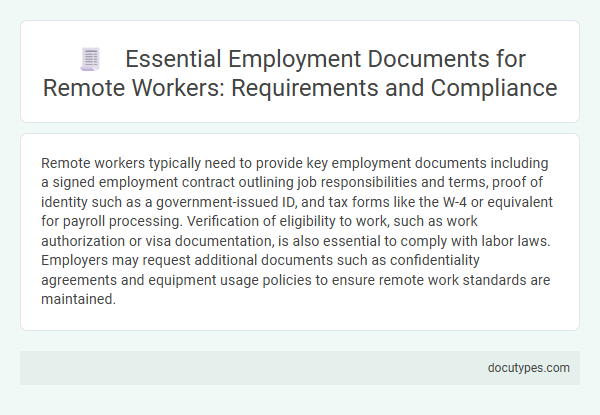Remote workers typically need to provide key employment documents including a signed employment contract outlining job responsibilities and terms, proof of identity such as a government-issued ID, and tax forms like the W-4 or equivalent for payroll processing. Verification of eligibility to work, such as work authorization or visa documentation, is also essential to comply with labor laws. Employers may request additional documents such as confidentiality agreements and equipment usage policies to ensure remote work standards are maintained.
Introduction to Essential Employment Documents for Remote Workers
Remote work requires specific documentation to ensure compliance and clear communication between employers and employees. Understanding the essential employment documents helps streamline the onboarding process and maintain legal standards.
- Employment Contract - Outlines job responsibilities, compensation, and terms of employment tailored for remote work arrangements.
- Tax Forms - Necessary for tax withholding and reporting according to the worker's location and jurisdiction.
- Confidentiality Agreement - Protects company information and intellectual property in a remote environment.
Key Legal Requirements for Remote Work Documentation
Remote workers require specific employment documents to ensure compliance with labor laws and company policies. Key documents include signed employment contracts, confidentiality agreements, and tax forms tailored to remote work arrangements.
Employers must also collect proof of identity and eligibility to work, such as government-issued IDs and completed I-9 forms in the U.S. Accurate records of work hours and payment methods are essential to meet legal and tax requirements for remote employees.
Employment Contracts: Core Elements and Remote-Specific Clauses
Employment contracts for remote workers must clearly outline core elements such as job responsibilities, compensation, and working hours. These contracts establish legal clarity and protect both employers and employees by defining expectations and obligations.
Remote-specific clauses address communication protocols, data security measures, and equipment provision to accommodate the unique nature of remote work. Including these clauses ensures smooth operation and compliance with company policies in a virtual environment.
Remote Work Policy Agreements: Defining Expectations and Boundaries
| Document | Description | Purpose |
|---|---|---|
| Remote Work Policy Agreement | Written agreement outlining rules, procedures, and expectations for employees working remotely. | Defines work hours, communication protocols, data security measures, and employee responsibilities to ensure accountability and productivity. |
| Employment Contract Addendum | Supplement to the original employment contract specifying remote work conditions. | Clarifies modifications to work location, equipment use, and confidentiality tailored for remote employment settings. |
| Confidentiality and Data Security Agreement | Document emphasizing the protection of sensitive company information when accessed remotely. | Establishes expectations for data handling, use of secure networks, and compliance with privacy policies. |
| Equipment and Technology Usage Agreement | Agreement detailing responsibilities related to company-owned or personal technology used for remote work. | Defines usage rules, maintenance duties, and liability for hardware or software provided for remote tasks. |
| Time Tracking and Reporting Guidelines | Instructions and policies for documenting work hours and project progress while working remotely. | Ensures accurate productivity monitoring and facilitates performance evaluations. |
Tax Forms and Payroll Documentation for Remote Employees
Remote workers must submit specific employment documents to ensure proper tax compliance and accurate payroll processing. Key tax forms include the W-4 for federal withholding in the United States and any relevant state tax withholding certificates depending on the employee's location. Payroll documentation should capture time tracking, direct deposit authorization, and any benefits enrollment forms for efficient compensation management.
Confidentiality and Non-Disclosure Agreements (NDAs)
Employment documents for remote workers must include Confidentiality and Non-Disclosure Agreements (NDAs) to protect sensitive company information. These legal contracts ensure that proprietary data remains secure regardless of the worker's location.
NDAs clearly outline the responsibilities and limitations regarding the use of confidential information. Remote employees are legally bound to prevent unauthorized disclosure or misuse of trade secrets. Your signed agreement safeguards both your rights and the company's intellectual property in a remote work environment.
Health and Safety Declarations for Home-Based Work
Health and safety declarations for home-based work are essential employment documents for remote workers. These declarations ensure that employees acknowledge their responsibility to maintain a safe and ergonomic workspace. Employers use these documents to comply with occupational health regulations and minimize work-related risks in remote environments.
Time Tracking and Attendance Recordkeeping
Employers must maintain accurate employment documents for remote workers to ensure compliance with labor laws. Time tracking and attendance recordkeeping are critical components in managing remote workforces effectively.
- Time Tracking Records - Document detailed logs of hours worked by remote employees to verify payroll accuracy and monitor productivity.
- Attendance Logs - Capture remote worker presence during scheduled shifts to support performance reviews and compliance audits.
- Timesheets - Require employees to submit signed timesheets validating hours worked and breaks taken for legal and financial documentation.
Proper documentation of time and attendance supports transparent management and protects both employer and employee rights.
Data Privacy and Security Compliance Documents
Remote workers must provide specific employment documents to ensure compliance with data privacy and security standards. These documents protect both the employee and employer by outlining responsibilities and safeguarding sensitive information.
- Data Privacy Agreement - This document details the employee's commitment to handling personal and company data according to legal and organizational privacy policies.
- Information Security Policy Acknowledgment - Employees confirm they understand and will adhere to the company's cybersecurity protocols and best practices.
- Confidentiality and Non-Disclosure Agreement (NDA) - This agreement ensures that sensitive business information remains protected and is not shared outside authorized channels.
What Employment Documents Are Needed for Remote Workers? Infographic

